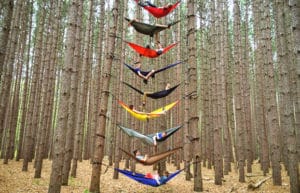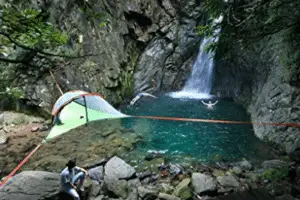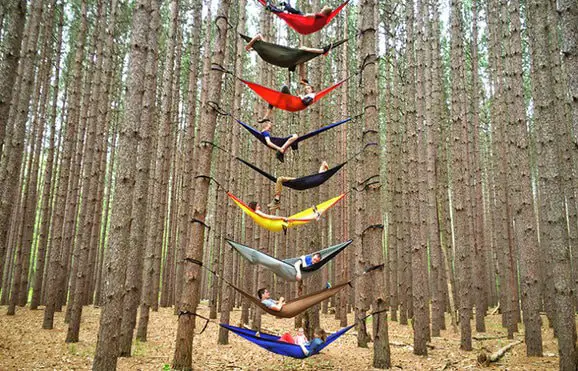
Admittedly I didn’t know much about hammock camping (or “hammocking”) at all growing up. High adventure trips to northern Ontario were in isolated cabins lit by kerosene lanterns (as long as we weren’t going for a wilderness survival merit badge), camping for summers at a time with Scouts was often done with a large 10 person tent back in the days where those poles weighed 40+ pounds, and once in a while practicing my survival skills meant building my own lean-to. Hammocks didn’t appear often, but in recent years it’s been hard to ignore the craze as many truly outstanding camping hammocks have been released and a wide array of respected outdoor enthusiasts have embraced this newer camping trend.
The argument of hammock camping vs. tent camping has come up more often recently, but what should a novice camper look at? Is hammock camping just for the ultralight backpackers in forested areas, or is it a legitimate and full replacement for sleeping in tents? There are plenty of good arguments for both sides here, so let’s dive in and take a look at both of them so you can make a decision based on the factors that are most important to you.

Table of Contents
Hammock Camping
Hammock camping, aka hammocking, has increased enormously in popularity in recent years but it has actually been around for some time. This is a general term referring to the practice of using hammocks as opposed to tents when it comes to camping outdoors. While hammock camping is heavily associated with through hikers and ultralight backpacking, there are many other times to go with a hammock over a traditional tent. This is especially true if you are camping solo, needed to bring your own tent, and are in a heavily wooded area.
Admittedly without woods, the hammock camping efforts sort of fall apart.
One thing to keep in mind is that the weight of the hammock itself is not the total amount that should be compared to tents. Hammocks still need straps, carabiners, and a rain fly or tarp to protect from rain. Even with all of these together, often times the camping hammock package weighs far less than an equivalent tent. This is important if the main concern is the weight of the pack based on long range hiking.
If you want the full run on hammocking you can check out our posts on the best camping hammocks as well as our (coming soon) master article on hammock camping.
PROS:
- Many campers report having less back pain from hammocks
- Many campers report a better night’s sleep on average
- Beautiful night view of the sky
- Extra light weight – great for ultralight backpackers
- In heavily forested areas hugely increases the number of suitable campsites available
- Very easy to leave no trace
- No worries about ground water during rain (we’re assuming you’re smart enough to pack a hammock rain fly)
CONS:
- Some people prefer the feeling of a fully enclosed shelter that tents give
- These only work in tree heavy areas with strong trees
- They are primarily designed as solely 1 person shelters
- Certain types of hammocks can seem tight or constricting
- Heat loss can be a major issue especially in windy weather – serious insulation is a must in cooler or colder weather!
 Tent Camping
Tent Camping
Tent camping is the form that far more outdoor enthusiasts are familiar with. Campers have often used tents for decades now and while tents have come a long way from a large piece of canvas tap set up with poles. By quite a margin this is still the most popular form of camping, but whether or not it is right for your needs can depend on your needs.
If you’re looking at just one or two people, a couple of hammocks might work just as well as some of the best 2 person tents out there, but hammocks are very clearly designed for one person with some of the widest versions okay for maybe two (although to me that arrangement looks awfully uncomfortable even if you don’t usually mind getting close).
On the other hand, in most cases for families hammocks won’t do at all. In fact, this is even true if everyone had their own hammock. There’s too much separation, people get spread out, and there’s no reason to look for 20 good strong trees right in the same area as opposed to just one great family tent for camping. Whether you can get away with a tent designed for 4-5 people or you need one of those extra large 10 to 12 person cabin tents, these are options for large families that make sense while there isn’t a good hammock alternative.
Tent camping is something many people are familiar with, it makes it easy to camp at established campsites, and even as many people do find that hammocks offer something special, there’s no danger of them replacing tents completely.
PROS:
- Full coverage in the elements / generally no need for an additional rain tarp
- Plenty of tent campsites set up with range of amenities
- Wide array of options when it comes to tent size, design, and setup
- Easily houses multiple people
- Repair kits and replacement stakes easily available
- Good for almost any environment as long as you can find a little bit of flat ground
CONS:
- You can’t always find a good spot to put down a tent
- Sleeping on hard ground can be a bit rough on the back
- Tents leave an obvious footprint/trace behind
- Less options in heavily wooded areas compared to hammocks
- Generally heavier than hammocks
One Perspective on Hammock Vs. Tent Camping
There are many people who find themselves among the growing legion of outdoor hammocking fans. While this will be the obvious choice for extreme hammockers, even for regular campers or ultralight backpackers who hit a lot of heavily wooded areas there are many good reasons to at least give hammocks a serious look. Individuals are going to find many advantages when it comes to hammocks, starting with carrying around much lighter weight in the packs and possibly moving on to much better sleeping experiences.
This is going with a bit of an assumption, because hammock camping doesn’t work in areas that don’t have many strong trees, but in wooded areas there’s a lot to love about hammocks and the additional freedom they give to hikers, campers, and the like.
Take a look at this fantastic video for a really good perspective coming from the point of view of why hammock camping is better than tent camping.
Great video on why hammock camping is superior
Another Perspective on Tent Vs. Hammock Camping
There are people on the other side of the argument, as well. The debate between tent and hammock camping isn’t one that is going to be easily settled, and there are very good arguments that are made for both sides of the debate. For some people hammocking is absolutely the way to go, while for others they grew up with tents, love tents, and even after trying out a good camping hammock they want to return to a tent.
Tents have been a long traditional way of camping out, and for larger families the answer is going to be obvious. Having all the kids and all the relatives under one shelter is important and that’s a system that is going to work really well. On the other hand if you’re camping solo or with a small group but each person has their own gear, then a hammock can work.
The following video is from one of my favorite channels (and it will be on our list of top Outdoor YouTube Channels) and comes from the point of view of Dixie who talks about how she went with a hammock for the weight savings but then switched back to a tent. This is only one perspective on the topic, but it’s a good counterpoint to the first video we shared.
Great video on switching from hammocks to tents

So Can There Be a Final Verdict?
So much of this will depend on area and preference. If you’re in the desert with no trees or in a wide open plains area, then a hammock just isn’t going to work. You need a tent or tent-like shelter in those situations.
On the other hand if you’re hiking an extremely long trail a hammock is extremely light, easy to set up in versatile ways, and many people do sleep a lot better in hammocks than they do when having to deal with a tent on the ground.
For me it’s an obvious choice: I’m a side sleeper who can’t sleep on my back and who on a “good night’s sleep” is going to toss and turn and get up at least three times to pee. I’m not hammock material unless I’m unknowingly in a Three Stooges movie. I’m going to have to go with tent camping (though I’d consider a hammock-tent hybrid), though the possibility of moving my side off the hard ground certainly is appealing.
That being said, I know plenty of ultralight backpackers and weekend campers who have gone with the hammock and haven’t looked back. If it works for you, then go with it! This is a debate that will have passionate outdoor fans on both sides, but there is no reason this can’t be a win-win for everyone involved.
In Conclusion
Everyone is going to have their preference and let’s face it: depending on the type of outdoor excursion you have in mind, how you sleep, or where you are one might be a better option than the other. The good news takeaway from all this should be that there are options. Whether you’re sleeping in the trees or on the ground, there are many different ways to get out and enjoy the natural world and everything that it has to offer.

